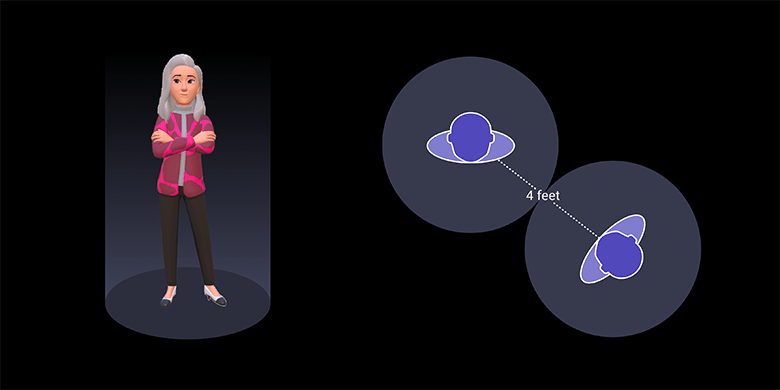Metaverse harassment: Meta pulls the emergency brake
A new Personal Boundary ensures that other avatars can only approach within about 4-foot distance in Meta's Metaverse Horizon. What's special is that this setting is the default and cannot be changed.
Meta's first Metaverse effort, Horizon Worlds, has been available in the US and Canada since mid-December 2021. The launch of the platform was not easy: The first reviews were mixed and only a few days passed before the first reports of "sexual harassment" by avatars appeared in the media.
What is meant here is that other avatars approach one's own avatar up to the intimate zone, make sexual gestures and choose corresponding words. By being embodied as an avatar in VR from the first-person perspective in a 3D world, such intimate approaches and hostilities can have an even stronger impact than, for example, in the comments of a conventional social network.
Toxic behavior and harassment in the metaverse as an "existential threat"
That's why Meta's incoming chief technology officer and Metaverse guru Andrew Bosworth warned his own staff in November 2021 that toxic behavior and harassment were an "existential threat" to Metaverse's own strategy. The platform must therefore offer "near-Disney-level" security, Bosworth said.
Digital-physical harassment and reports of it are not a problem specific to Horizon Worlds. The phenomenon has existed since avatars began meeting in VR. Developers of social VR platforms introduced various safeguards such as a minimum distance between avatars years ago.
Meta was therefore prepared. Horizon Worlds offers some established safety measures, such as spacers for virtual hands and blocking functions for other avatars, as well as invisible moderators who observe what is happening in the event of complaints and block users if necessary.
Meta makes distance the standard
Since reports of harassment in Metaverse have now been published nevertheless, the company has obviously underestimated the sensitivity of individual users - and is now tightening the rules.
From now on, there will be a safety distance of about 4-foot between the individual avatars by default. The social zone (for strangers) in real life is about the same distance, the personal zone (friends, family, etc.) in real life is around 2-foot. Meta, therefore, tends towards safety when it comes to VR distance.
This is also reflected in another point: The safety distance cannot be configured for the time being. This feature will possibly be added at a later time.
"We are intentionally rolling out Personal Boundary as always-on, by default, because we think this will help to set behavioral norms—and that’s important for a relatively new medium like VR," writes Horizon manager Vivek Sharma.

The virtual safety distance in Horizon Worlds is not adjustable for now. | Image: Meta
The standard implementation shows that Meta is increasingly focusing - and must focus - on security and caution. The company simply cannot afford to have the just-launched Metaverse platform fall into similar waters in public opinion as Facebook and Instagram, which in some people's eyes do more harm than good to society.
The standard safety distance is an emergency brake for Meta to protect the reputation of the metaverse
That the preset safety distance is a painful compromise and a downright emergency brake for Meta in favor of safety, also as a hedge against further negative reports, can be seen in a social feature description by Sharma: "Note that because Personal Boundary is the default experience, you’ll need to extend your arms to be able to high-five or fist bump other people’s avatars in Horizon Worlds or in Horizon Venues."
Yet this very sense of physical proximity and direct interaction in the digital has been Meta's main argument ("Defy Distance") for its billion-dollar investments specifically in VR technology for years. This argument is not completely invalidated by the standard safety zone - but it loses weight for the time being.
Read more about the Metaverse:
- Meta rolls out improved metaverse avatars
- Living in the Metaverse: This philosopher advocates the sci-fi vision
- Microsoft chief sees Metaverse as the "next wave of the Internet"
Note: Links to online stores in articles can be so-called affiliate links. If you buy through this link, MIXED receives a commission from the provider. For you the price does not change.